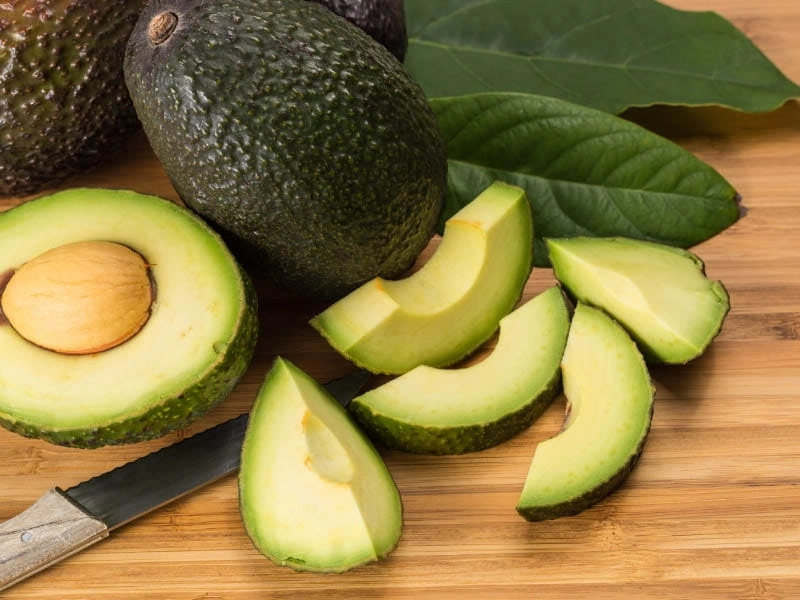Avocado on an Empty Stomach
A food high in nutrients, avocados are full of fiber, vitamins, minerals, and good fats. Consuming this fruit without any food in between can enhance the absorption of its nutrients.
A nutrient study found that eating avocado for breakfast improves blood flow in overweight people, which can affect blood pressure and other factors. In addition to being high in potassium, which is good for the heart, this fruit also has two carotenoids called lutein and zeaxanthin that can shield your vision.
1. It may cause you to become ill.

The avocado, or Persea americana, is a fruit high in nutrients that include fiber, vitamins, and minerals, as well as good fats. It's a really adaptable dish that tastes well on its own or when precisely paired with other meals. It is also well-known for its numerous health advantages, which include supporting weight management and better nutritional absorption.
Given that avocados can induce gastrointestinal problems, including bloating and pain, eating them on an empty stomach might not be a good idea. It can also disrupt the quality of your sleep by delaying the release of melatonin and altering your body's metabolism while you're asleep.
Avocados are rich in monounsaturated fats, potassium, vitamin K, and folate—components that can help you eat a balanced diet and reduce your chance of heart disease. Still, eating it right before bed can lead to weight gain because sleep slows down your body's metabolism. If you have an allergy to other fruits, nuts, or vegetables, or pollen from birch trees, it may also irritate your skin.
2. It may result in bloating

When used as a topping for salads or sandwiches, or as part of the classic chip and guacamole appetizers, avocados may be a terrific supplement to a healthy diet. However, this fruit might induce bloating and stomach pain if a person has an allergy or intolerance to it. This shouldn't be an issue if avocados are consumed as part of a balanced diet because they are a good source of fiber and potassium, among other vital elements.
According to studies, consuming a diet high in FODMAPs, including avocado, increases the amount of gut bacteria that ferment fiber, which can cause bloating and gas. Although this is beneficial for gut health in general, it might not be the best option for those who are already suffering from these symptoms and carrying excess weight.
Furthermore, it's critical to consume avocados while they're still firm and fresh, on an empty stomach. A ripe avocado should not be consumed if it is soft to the touch, has brown patches, or has an unpleasant odor.
3. It could fill you up.

Avocados can make you feel full when eaten on an empty stomach, especially if you consume too much of them at once. Indigestion and other symptoms may result from this. Eat smaller portions of avocado more frequently throughout the day to prevent this. Additionally, consider consuming it with other foods like yogurt or milk that might aid in neutralizing acidity. Additionally, to help balance the acids in your stomach, drink a lot of water.
Avocados are packed with fiber, vitamins, minerals, and good fats that help you feel full and satisfied. They can also help with weight management objectives and offer continuous energy release.
According to a recent study, eating avocado on an empty stomach causes your gut to produce more of a hormone that reduces appetite. This may promote your weight loss goals by making you feel fuller and causing you to eat less at meals. Avocados also contain a lot of fiber, which helps avoid constipation and encourages regular bowel movements.
4. It could make you throw up.

Over time, maintaining a healthy weight and reducing your risk of heart disease can be achieved with the help of avocados' healthful fats. To reap the health advantages of avocado, use it in salads, omelets, and sandwiches all day long. But consuming an excessive amount of avocados might cause weight gain and illness.
On an empty stomach, consuming a tiny bit of avocado may help with digestion and nutrient absorption. Additionally, it might stop you from overindulging and having unhealthy food snacks later in the day.
Potassium, fiber, and vitamins A, C, E, and K are among the many nutrients found in avocados. They also offer a source of monounsaturated fats, which lower cholesterol and are beneficial to the heart. They also assist in lowering blood pressure and reducing gastrointestinal tract irritation. Furthermore, a 2021 study discovered that eating avocados every day lowers the quantity of bile acid in the feces and increases the number of bacteria that digest fiber.








